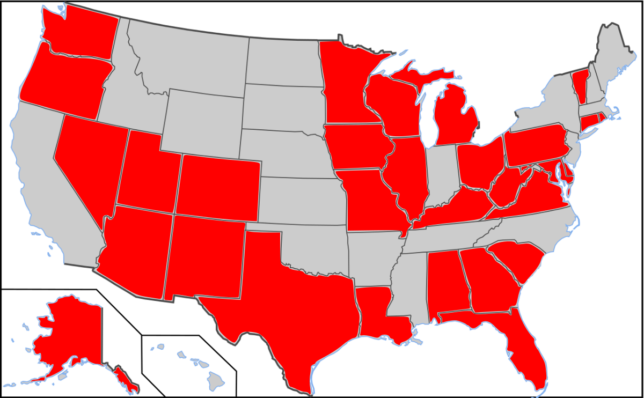Organization Trends
ERIC’s Friends in the Activist Left: Secret Meetings with Elections Officials
 States that are members of the Electronic Registration Information Center (ERIC). Credit: r Bartonlynch. License: Wikimedia.
States that are members of the Electronic Registration Information Center (ERIC). Credit: r Bartonlynch. License: Wikimedia.

Part of our developing series on the
Electronic Registration Information Center
ERIC’s Friends in the Activist Left (full series)
Born in the Shadows | CEIR and ERIC
Secret Meetings with Elections Officials
Secret Meetings with Election Officials
CEIR held “invitation-only small . . . 25-person bipartisan convening[s]” throughout 2022, inviting election officials and Democratic operatives to “discuss ways to assist those protecting democracy, strengthen guardrails, and identify gaps.” Where legally permitted, CEIR paid for air travel, hotel rooms, and meals. We know that Leigh Chapman was reimbursed by Pennsylvania for over $1,800 for attending CEIR’s May meeting, according to public records obtained by the American Accountability Foundation.
The first of these “bipartisan meeting[s]” was held in May in Phoenix, Arizona, and discussed “urgent needs facing the field of elections and democracy this year.” In one email Becker boasts to Chapman:
I’ve been working with Sec. [Jocelyn] Benson, Ben Ginsberg, and Bob Bauer to put this together, and it’s focused on immediate threats to democracy, particularly in the states where those threats have been greatest, including Pennsylvania.
CEIR held a second “private and off the record” meeting with “the Phoenix group” in early September in Detroit, Michigan. The list of invitees to both secret meetings, which also includes most of the above award recipients, is stunning:
- Bill Gates
- Michigan Secretary of State Jocelyn Benson
- Georgia Secretary of State Brad Raffensperger
- Pennsylvania Acting Secretary of the Commonwealth Leigh Chapman (D)
- Former Kentucky Secretary of State Trey Grayson
- Miami-Dade County, Florida, Elections Supervisor Christina White
- Cathy Darling Allen, registrar of voters for Shasta County, California
- Joe Gloria, registrar of voters for Clark County, Nevada
- Maricopa County, Arizona Recorder Stephen Richer
- Hillsborough County, Florida, Supervisor Craig Latimer
- Los Angeles County Registrar-Recorder Dean Logan
- Milwaukee Elections Director Claire Woodall-Vogg
- Ottawa County, Michigan, Clerk Justin Roebuck
- Marion County, Florida, Elections Supervisor Wesley Wilcox
- Ex-Wisconsin Assemblyman Dean Knudson (R), who resigned from the Wisconsin Elections Commission in May after criticizing Republicans for disputing the 2020 election results
- Former Obama White House Counsel Bob Bauer, part of the Safeguarding Democracy Project
- Matthew Masteron, director of information integrity for Microsoft
- Jennifer Morrell, a partner at the Elections Group, which advises on expanding vote by mail in partnership with the Zuck bucks recipient Center for Tech and Civic Life (CTCL)
- Joanna Lydgate, former Massachusetts deputy attorney general and CEO of States United Democracy Center, a center-left election “reform” group that coordinated legal counterstrategy against the Trump campaign after the 2020 election
- Protect Democracy director Ian Bassin, whose group sued President Trump for allegedly conspiring with Russia to release Democratic Party emails in 2016
- Paige Alexander, head of the Gates Foundation-funded Carter Center founded by former President Jimmy Carter
The Future of ERIC
ERIC’s ties to David Becker and the professional Left ought to make conservatives skeptical of its value to states. Louisiana—one of the first states to join the compact—left ERIC in January 2022, citing:
concerns raised by citizens, government watchdog organizations and media reports about potential questionable funding sources and that possibly partisan actors may have access to ERIC network data for political purposes, potentially undermining voter confidence.
Will more states follow? Many watchdog groups hope so. The conservative Michigan Fair Elections coalition calls ERIC membership “unlawful and unethical” under the Freedom of Information and National Voter Registration Acts, and believes it puts election integrity “at risk.” Instead, the coalition supports annual forensic audits of state voter rolls, software that tracks deaths nationwide (used by Ancestry.com), and adoption of the Department of Homeland Security’s status verification service to remove noncitizens from voter rolls, among other policies.
There are alternatives to ERIC available. From 2005 to 2019, 28 states participated in the Interstate Voter Registration Crosscheck program (often shortened to “Crosscheck”), which aggregated voter registration records to ensure voters don’t register in multiple states. Notably, Crosscheck didn’t charge membership dues and had no registration component. The program suffered from security and accuracy issues and was ultimately abandoned following a lawsuit by the American Civil Liberties Union (ACLU), which accused it of making voter rolls vulnerable to hacking. While the first iteration failed, it’s easy to imagine ERIC skeptics forming a more robust successor in the near future.
Until then, the Left’s top voter registration machine will continue churning.


